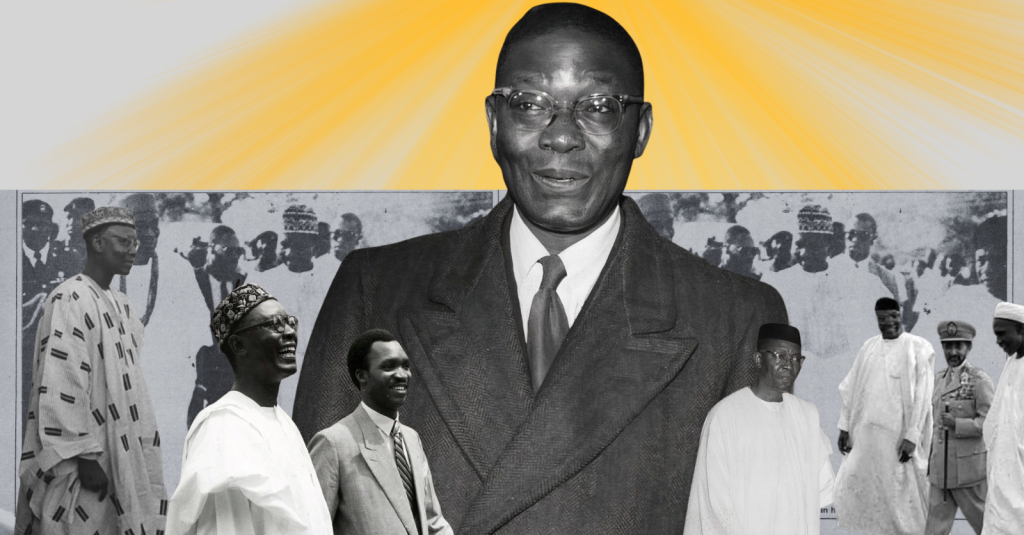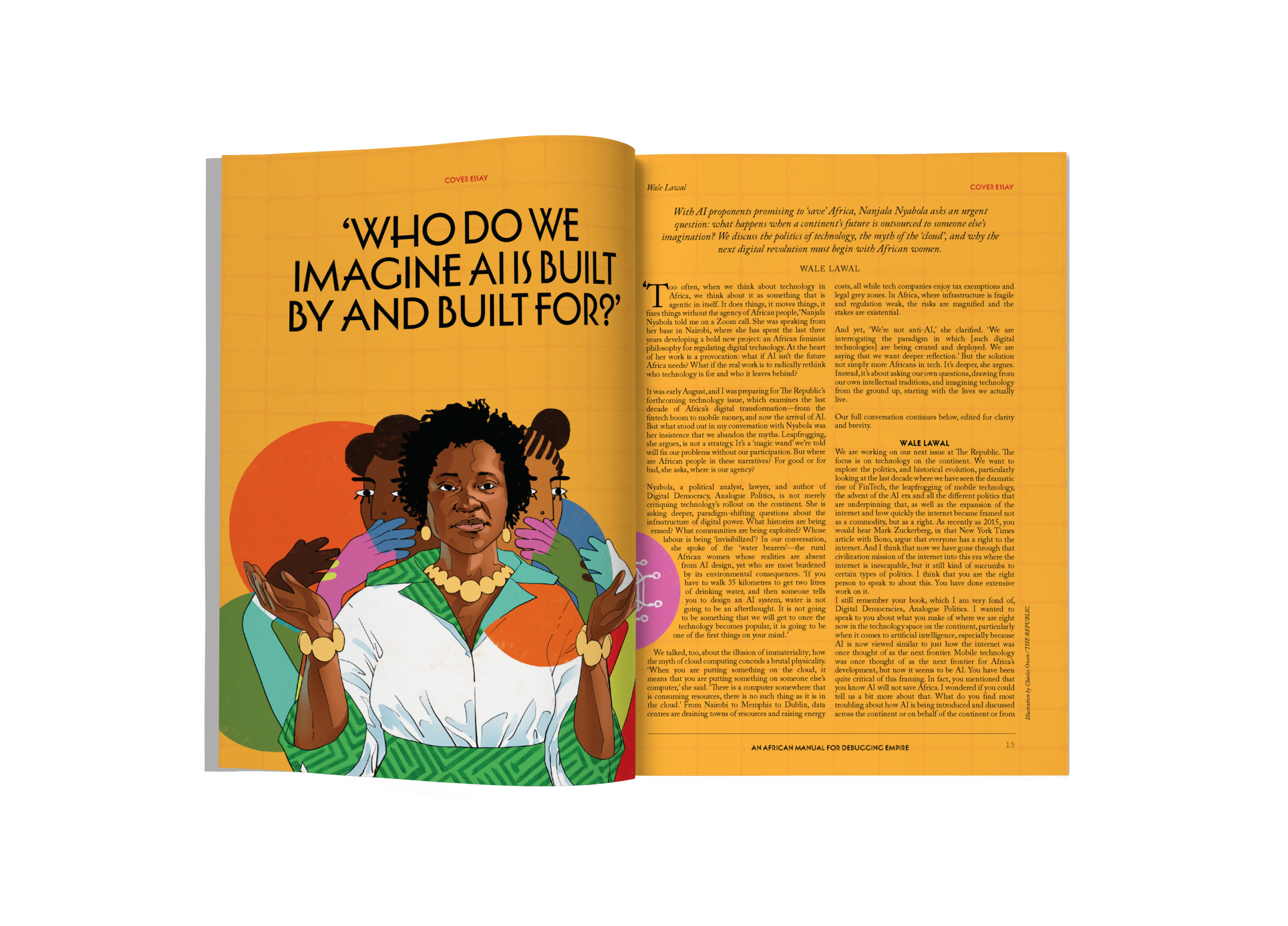
Photo Illustration by Ezinne Osueke / THE REPUBLIC. Source Ref: WIKIMEDIA.
THE MINISTRY OF MEMORIES
Is This the Federation Nnamdi Azikiwe Fought For?

Photo Illustration by Ezinne Osueke / THE REPUBLIC. Source Ref: WIKIMEDIA.
THE MINISTRY OF MEMORIES
Is This the Federation Nnamdi Azikiwe Fought For?
Long before the Nnamdi Kanu– and Sunday Igboho-led calls for the ethnic secession of Igbo and Yoruba people, respectively, in the 2000s; before the Chukwuemeka Ojukwu– and Isaac Adaka Boro-led Biafra and Niger Delta Republic secessions, respectively, of the 1960s, Nnamdi Azikiwe, then president of the National Council of Nigeria and the Cameroons, addressed his party caucus on 12 May 1953 about the consequences of the North seceding from Nigeria. Azikiwe’s speech served as an intervention to address the rumours of a planned exit of the North from Nigeria. He highlighted the need for Nigeria to be united despite the differences. As one of those at the vanguard of the quest for Nigeria’s independence, Azikiwe was not oblivious to the internal ethnic divide of the country. However, he felt that the country could work through its differences and benefit from the union. Despite believing that the South would fare better in the event of a secession, he argued that ‘it would be better if all the regions would address themselves to the task of crystallizing common nationality, irrespective of the extraneous influences at work.’
More than 60 years after Azikiwe made this passionate plea for national unity, Nigeria still exists, although on the precipice. The country has ‘survived’ several attempts at breakaway, although a few have ironically achieved situations where the country still exists but is more fractured. For example, the aftermath of the Biafran War (1967–1970) has left the South East region feeling more marginalized ever since.
As Nigeria celebrates its 65th anniversary, there is a question of whether Nigeria is a nation in the true sense of nationhood. Each election cycle, despite being a growth in the sense of strengthening democracy, tears the fabric of the country apart as ugly ethnic and religious divides are exploited by political leaders and perpetuated by citizens. Have the labours of our ‘heroes past’, of strong nationalists like Azikiwe, been in vain?
THE NIGERIA THAT AZIKIWE ENVISIONED
Azikiwe’s speech calling on northern Nigeria to reconsider its planned secession from Nigeria shortly before independence was not an isolated representation of his views about Nigeria. He represents the ideal Nigerian and would have, in this age, been described as a detribalized Nigerian. Born on 16 November in Zungeru, in present-day Niger State in northern Nigeria, to parents from Onitsha, Anambra State, in eastern Nigeria, Azikiwe moved to Lagos in 1914 to attend school. These different experiences of living in various parts of Nigeria shaped Azikiwe, as he learnt to speak the three major Nigerian languages: Hausa, from being born in the North; Igbo, from his parents; and Yoruba, from his schooling. He acknowledged his northern connection in his aforementioned speech, where he said that, ‘As one who was born in the North, I have a deep spiritual attachment to that part of the country.’
Azikiwe’s love for Nigeria may be misconstrued as someone who was only interested in a united Nigeria only because he was thinking of ascending to its leadership position, but this is not the case. His love for a united Nigeria and, by extension, a united Africa, was at the forefront of his foreign policy and personal conviction. On 16 November 1960, a month after independence, Azikiwe delivered another speech titled ‘Respect for Human Dignity’ during his inauguration as governor-general and commander-in-chief of Nigeria’s armed forces.
shop the republic
-
‘The Empire Hacks Back’ by Olalekan Jeyifous by Olalekan Jeyifous
₦70,000.00 – ₦75,000.00Price range: ₦70,000.00 through ₦75,000.00 -
‘Make the World Burn Again’ by Edel Rodriguez by Edel Rodriguez
₦70,000.00 – ₦75,000.00Price range: ₦70,000.00 through ₦75,000.00 -
‘Nigerian Theatre’ Print by Shalom Ojo
₦150,000.00 -
‘Natural Synthesis’ Print by Diana Ejaita
₦70,000.00 – ₦75,000.00Price range: ₦70,000.00 through ₦75,000.00
In his address, Azikiwe spoke passionately about his joy at Nigeria being independent after years of being under British colonial rule, but he was quick to follow it up with greater delight that, unlike other countries struggling to maintain peaceful coexistence, Nigeria had all the makings of a country that could stand the test of time despite ethnic differences. He said:
I am satisfied that the present arrangements made by those of us, who may be rightly described as the makers of contemporary Nigeria, have ushered freedom into our country and preserved our unity as a nation. I am happy that history has assigned to me an important part to play in order that this unity may have lasting effects and bring home to our people the need to maintain it religiously.
I am all the more overjoyed that Nigeria is free and independent without necessarily going the way of certain States in Africa, Asia and Europe, whose instability has been of great concern to the United Nations and the rest of the world.
Democracy is an interesting concept as it requires a healthy dose of polarization. For citizens to participate in the process of nation-building, they must first be motivated either by something they desire or something that they reject. Thus, democracy is a game of who can inherit the largest number of those on one side of the divide. Professors of political science, Jennifer McCoy and Murat Somer, in their 2019 essay, ‘Toward a Theory of Pernicious Polarization and How It Harms Democracies: Comparative Evidence and Possible Remedies’, recognize this polarization as ‘a process whereby the normal multiplicity of differences in the society increasingly align along a single dimension, cross-cutting differences become reinforcing, and people increasingly perceive and describe politics and society in terms of “us” versus “them.”’ If polarization is based on policies, there can be a middle ground. However, according to Filip Milačić in his 2021 essay, ‘The Negative Impact of Polarization on Democracy’, ‘it is difficult when discussing the questions of who belongs to the nation or topics like religion, race, ethnicity or language.’
The end of British rule in Nigeria ushered in a period of brutal realization that brothers and sisters who came together to fight for independence suddenly needed to go against each other to win elections. Azikiwe recognized the effect of the polarization that democracy and elections brought. In his inauguration speech, he said:
The British came here in 1851 and found us hopelessly divided into tribal compartments. When Britain transferred power to us on 1st October, 1960, we were no longer an expression of geography but a reality of history. During all our years of political vassalage we became socially and economically integrated. We have also developed an identity of interest and we have crystallised common nationality. The process of political integration reached its zenith at midnight of 30th September,1960; when we lustily sang our National Anthem and our National Flag was hoisted aloft to signal the birth of a new nation.
Come and join Abubakar with me, Sardauna, Awolowo, Akintola, Osadebay, Okpara, Ikoku, Aminu Kano, Ibrahim Imam and Tarka. Let us bind the nation’s wound and let us heal the breaches of the past so that in forging our nation there shall emerge on this continent a hate-free, fear-free and greed-free people, who shall be in the vanguard of a world task force, whose assignment is not only to revive the status of man in Africa, but to restore the dignity of man in the world.
Azikiwe identified the impact political leaders have on citizens and how they could influence the stability of the nation. He appealed to ‘all our leaders, far and near, to forget the wounds which were inflicted in the course of our internecine altercations. The love of our country should outweigh the love of our petty selves.’
shop the republic
THE NIGERIA OF TODAY
65 years after independence, Nigeria is not stronger as a nation than it was at independence. Instead, the country is struggling to get over its ethno-religious divide. Sadly, politicians recognize the power of this polarization and exploit it for political gain. Winning an election, especially at the presidential level, does not mathematically require the support of the entire nation, but rather the support of the ethnic groups with the largest population. The 2015 presidential election proved this. Muhammadu Buhari, the All Progressives Congress candidate, aware of his unpopularity in the South East from previous presidential elections, focused his campaign on the North and South West. This strategy paid off as the overwhelming votes from these two regions were enough to make him president.
To further confirm what many suspected, shortly after he was sworn in as president, Buhari at a town hall organized by the United States Institute of Peace in Washington said that, ‘The constituents…that gave me 97 per cent (of the vote) cannot, in all honesty, be treated on some issues with constituencies that gave me five per cent.’ His statement sparked uproar, but the resultant effect was the further polarization of a fragile nation. It came as little surprise when 58 per cent of Nigerians expressed displeasure in how the Buhari government managed ethnic divide, according to a 2021 poll by Africa Polling Institute.
In 2023, Bola Ahmed Tinubu borrowed a leaf from Buhari’s playbook and won his presidential election due to an alliance of northern and southwestern Nigeria. He went a step further to guarantee his chances in the North by opting for a Muslim running mate, as against the unwritten rule of religious balance.
Another presidential candidate in 2023, Peter Obi, perhaps as a last-minute attempt to garner Christian votes, reportedly spoke with Pastor David Oyedepo, asking him to help call on Christians to vote for him, describing the election as a ‘religious war’.
The 2023 elections also saw situations where Igbos, or those who were perceived to be Igbos, were disenfranchised in certain places. While Tinubu himself did not make disparaging comments during the period, his refusal to stop playing the ostrich and address the descent of the country into ethnic division does not help the unity of the country. With his eye focused on the 2027 elections, Tinubu, as president, has shown little effort to push for the unity of the country and has even been accused of running a Yoruba-centric country through his political appointments.
shop the republic
THE WAY FORWARD
In recent years, Independence Day celebrations have elicited little fanfare. The days of Nigerians donning clothes with shades of green and white in celebration of independence seem to be disappearing, a testament to the lack of interest from Nigerians. While economic factor is a likely reason, the sense of patriotism and nationalism fostered by unity in diversity is seeping away. One cannot deny that ethno-religious tension is fuelling the lack of unity.
Unfortunately, there is little hope that the future will be any better. Judging by discussions and debates on Nigerian social media, the future is alarming, almost to the point of being dire. Young Nigerians, who dominate online discourse and shape the conversations on social media platforms, are not only fuelling ethno-religious hate but also channelling their strength into spreading this cancer. Meanwhile, political leaders who should serve as the common ‘enemy’ now watch, possibly in delight, as young educated Nigerians escalate ethnic divide instead of fostering discourse that holds power to account.
This year’s independence anniversary should be an opportunity for sober reflection on whether today’s Nigeria reflects what heroes past like Azikiwe envisaged during the fight for independence. If it does not, then Nigerians, especially the youth, must change the course of the country by uniting against those benefitting from its toxic polarity and make Nigeria a reflection of Azikiwe’s vision⎈
BUY THE MAGAZINE AND/OR THE COVER
-
‘The Empire Hacks Back’ by Olalekan Jeyifous by Olalekan Jeyifous
₦70,000.00 – ₦75,000.00Price range: ₦70,000.00 through ₦75,000.00 This product has multiple variants. The options may be chosen on the product page -
The Republic V9, N3 An African Manual for Debugging Empire
₦40,000.00
US$49.99













